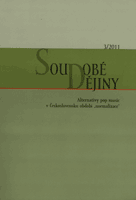Není invaze jako invaze. Import „východního“ rocku do Československa v 70. letech a jeho limity
Not Every Invasion Is Alike: The Importation of ‘Eastern’ Rock to Czechoslovakia in the 1970s and Its Limits
Author(s): Miroslav VaněkSubject(s): Music
Published by: AV ČR - Akademie věd České republiky - Ústav pro soudobé dějiny
Summary/Abstract: The author discusses the Czechoslovak reception of Polish, Hungarian, and East German rock music in the 1970s. He argues that after the crushing of the Prague Spring of 1968 the briskly developing Czechoslovak rock scene was hard hit by state-imposed restrictions, which also limited opportunities to listen to rock music from the West. The vacuum was partly filled by East European music groups that had been gaining in popularity in Czechoslovakia since the 1970s. During the ‘normalization’ period their record albums could be purchased in the Polish, Hungarian, and East German cultural centres in Prague and Bratislava. Moreover, rock fans in Czechoslovak towns could from time to time also enjoy live concerts by their favourite musicians from the ‘fraternal’ states. In particular, Czesław Niemen and the Polish group SBB, the Hungarian groups Omega and Locomotiv GT, and the East German group Die Puhdys enjoyed popularity here. But their performances sometimes also ran up against the incomprehension and obstruction of the authorities, which the author illustrates with the example of the Locomotiv GT concert at the Lucerna, Prague, in September 1973. According to the official assessment, this concert was inconsistent with ‘socialist entertainment’, and it became the impetus for further restrictions on concerts by local rock groups and visits by sought-after East-bloc groups. According to the author, the situation in Czechoslovakia was in this sense more rigid than, for example, in Poland or Hungary.
Journal: Soudobé Dějiny
- Issue Year: XVIII/2011
- Issue No: 03
- Page Range: 330-345
- Page Count: 16
- Language: Czech

